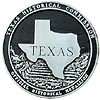| |
|
|
Megargel |
|
 |
|
Cedar St. at 3rd St., Megargel,
TX,
USA
Latitude & Longitude:
33° 27' 3.3984",
-98° 55' 26.6988"
|
| |
| |
|
Texas State
Historical Marker |
Megargel In 1910, thirty years after the Texas Legislature created Archer County, the Gulf, Texas & Western Railroad began extending its track from Jacksboro to Seymour. That year the trinity townsite company laid out a new town along the tracks on land purchased from the prominent Meade family. The company named the town Megargel for the rail company president, Roy C. Megargel. Within a few months of its founding, Megargel had almost two dozen stores, a hotel, a bank and a post office. Town residents soon organized a school district, served initially by three teachers. The population continued to grow and in 1914, the Megargel Times began its run as the city paper. In 1917, Megargel residents built a new schoolhouse; the first graduating class, in 1918, consisted of five students. A second population boom began in 1923 with the opening of the nearby Swastika oilfield. Although Megargel suffered a disastrous downtown fire in 1925, it continued to grow rapidly as a result of regional oil production. By 1926, there were approximately 350 operating wells in the vicinity. During that time, the town's first theater opened. The school district, also growing, created one of Texas' earliest high school bands in 1927. Although the area continued to produce oil, the Great Depression and other factors caused a decline in population. During World War II, the railroad was abandoned and many residents left for military service or to work in wartime industries. Today, in addition to oil, agriculture is an important part of the economy. The Megargel Cemetery and other historic resources help preserve the link to the town's history and boom era.
This page last updated: 7/15/2008 |
Megargel Historical Marker Location Map, Texas
|
|
|
|


